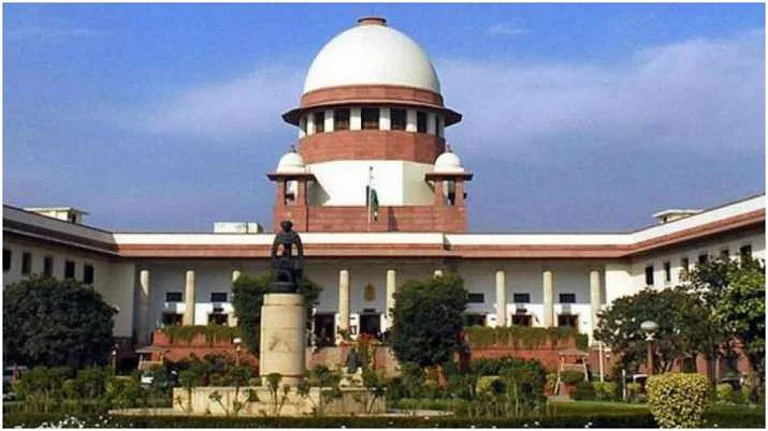In a landmark judgement, the Supreme Court on Thursday struck down the Centre’s electoral bonds scheme, terming it “unconstitutional”. Chief Justice of India DY Chandrachud, heading the five-judge bench, observed that anonymous electoral bonds are violative of freedom of speech and expression.
A top court bench comprising CJI Chandrachud, and Justices Sanjiv Khanna, BR Gavai, JB Pardiwala and Manoj Misra pronounced two separate but unanimous verdicts in the case. "Information about funding of political parties is essential for the effective exercise of the choice of voting," the CJI said, stressing on the importance of open governance. The court has ordered the State Bank of India to disclose to the Election Commission the names of the contributors to the six-year-old scheme and details of the EBs purchased since April 12, 2019, to date.
Significantly, the court has also ordered the EC to publish these details on its website by March 13 following which political parties should return the EBs which have not been encashed and the issuing bank should then refund the amount to the donor's account.
The Supreme Court’s decision is a major blow to the Bharatiya Janata Party (BJP) which has, between 2018 and 2022, collected 57 per cent of the total EB donations, amounting to a total of Rs 5,271 crore, as per the data available on Election Commission website. Congress, the second-highest beneficiary of the scheme, received Rs 952 crore in that duration.
Also Read: Electoral Bond Data Reveals Startling Facts
What are electoral bonds?
Electoral bonds (EBs) are “bearer” instruments that function like currency notes. The bonds are issued specifically to serve as funds for political parties. They can be purchased by individuals, groups or corporate organisations and donated to political parties, who can then use this funding free of interest, 15 days after receiving it.
The Electoral Bond scheme, which was notified by the government on January 2, 2018, was pitched as an alternative to cash donations — the norm earlier followed by political parties — to bring in “transparency” in political funding, and curb black money circulation. According to the provisions of the scheme, electoral bonds may be purchased by any citizen of India or entity incorporated or established in the country.
One of the major points of contention in the proposal for EB scheme was, however, that while in cash donations above Rs 20,000, the parties were bound to reveal the name of the donor, in case of electoral bonds, they remain anonymous. Critics felt that the scheme was shrouded in secrecy and hence, could potentially be undemocratic and act as a cover for corruption.
What Supreme Court said in its verdict?
“We are of the opinion that least restrictive means test is not satisfied. There are other means other than electoral bonds to achieve that purpose,” CJI Chandrachud ruled, after considering a three-pronged proportionality test outlined in 2017 Puttaswamy judgement. “Thus, curbing black money is not a ground for electoral bonds,” he said, banning the Centre’s proposed EB scheme.
“Constitution does not turn a blind eye only because there is a possibility of misuse... Clause 7(4) of the scheme tilts the balance in favour of informational privacy because it grants anonymity to the contributors but there is no nexus to balancing measures adopted,” the CJI said, rejecting the Centre’s argument on Right to Privacy. It said that while privacy of donors is important, transparency in political funding cannot be achieved by granting absolute exemptions.
The bench also termed the amendments to Representation of Peoples Act and Companies Act as “violative” of Article 14. On the amendment to Companies Act, CJI said that a company has “much graver influence on the political process” than individual contributions.
“A company has a much graver influence on the political process, both in terms of the quantum of money contributed to political parties and the purpose of making such contributions. Contributions made by individuals have a degree of support or affiliation to a political association. However, contributions made by companies are purely business transactions made with the intent of securing benefits in return. The amendment to Section 182 is manifestly arbitrary for treating political contributions by companies and individuals alike,” he observed.
The Supreme Court had heard the matter pertaining to the controversial scheme in November last year based on PILs by NGO, Association for Democratic Reforms, Communist Party of India (Marxist) and other petitioners. The petitioners had sought an urgent appeal in the court citing serious apprehensions that any further sale of electoral bonds could increase illegal and illicit funding of political parties through shell companies. Reserving its verdict then, the Supreme Court had said that the bonds “put a premium on opacity”.
Opposition members and critics of the scheme have pointed out that in six years since the EB scheme was launched, the ruling government has already significantly benefitted from the “secret” donations. However, with Supreme Court’s verdict, many feel that it restores faith and justice, especially in the run-up to the upcoming Lok Sabha elections.


























